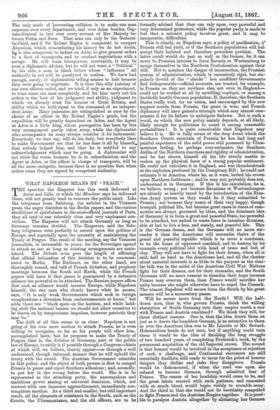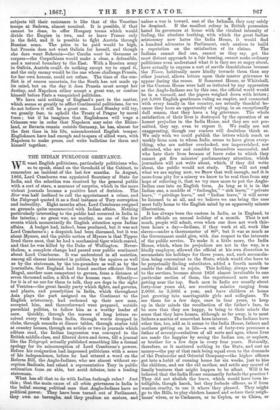WHAT NAPOLEON MEANS BY " PEACE." T HE speeches the Emperor
has this week delivered at Arras and Lille, or which the Moniteur says he delivered there, will not greatly tend to reassure the public mind. Like the telegrams from Salzburg, the articles in the Viennese press, the angry diatribes in the Berlin papers, and the curious ebullitions of spitefulness in the semi-official journals of Paris, they all tend to one tolerably clear and very unpleasant con- viction. The Emperor will not attack Germany as long as Germany remains divided. The Emperors, said the Salz- burg telegrams, were perfectly in accord upon the politics of Europe, and especially upon the necessity of maintaining the Treaty of Prague. The result of the meeting, say the Viennese journalists, is favourable to peace, for the Sovereigns agreed to attack no one as long as existing arrangements are main- tained. The Debatte even goes the length of affirming that official intimation of this decision is to be communi- cated to Berlin. The Berliners, on the other hand, are thoroughly roused, and talk of French dictation, and prophesy meetings between the South and North, while the French papers will have it that peace is guaranteed by a defensive alliance too powerful to be attacked. The Russian papers affirm that such an alliance would menace Europe, while Napoleon himself, the one man who clearly knows what he means, says, " It is only weak Governments which seek in foreign complications a diversion from embarrassments at home," but adds, there are " black spots on the horizon, and while hold- ing aloft the national banner we should not allow ourselves to be drawn on by tempestuous impulses, however patriotic they may be."
The drift of all this seems to us clear. Napoleon is not going of his own mere motion to attack Prussia, he is even willing to recognize, so far as his people will allow him, accomplished facts, but he proposes to make the Treaty of Prague, that is, the division of Germany, part of the public law of Europe, to ratify it if possible through a Congress—hints of which will, we believe, shortly appear—or through a well understood, though informal, menace that he will uphold the treaty with the sword. The Austrian Government coincides in this policy, and the object of both powers is first to compel Prussia to pause and reject Southern adhesions ; and, secondly, to put her in the wrong before the world. She is to be represented as the attacking party, the unscrupulous and ambitious power aiming at universal dominion, which, not content with one immense aggrandizement, immediately con- templates another. As a third and smaller, but still important result, all the elements of resistance in the South, such as the Courts, the Ultramontanes, and the old officers, are to be formally advised that they can rely upon very powerful and very determined protectors, while the popular party is made to feel that a unionist policy involves great, and it may be insuperable, difficulties.
This is clearly, as Napoleon says, a policy of pacification, if Prussia will but yield, or if the Southern populations will but accept their isolated and therefore powerless position. The latter result would do just as well as the former, for it can never be Prussian interest to force Bavaria or Wurtemburg to merge themselves in the Northern Confederation against their- will. Not to mention the danger of insurrection, the Prussian system of administration, which is excessively rigid, but sin- gularly devoid of the " checks " less confident Governments find indispensable—official accounts are trusted, for example, in Prussia as they are nowhere else, not even in England— could not be worked at all by unwilling employe's, or among a. decidedly hostile German population. If, therefore, the Southern States really wish for no union, and encouraged by this new- support recede from Prussia, the game is won, and French diplomacy will have gained a triumph which may almost com- pensate it for its failure to anticipate Sadowa. But is such a recoil, on which the new policy mainly depends, at all likely, likely enough for politicians to count it among reasonable- probabilities ? It is quite conceivable that Napoleon may believe it is. He is fully aware of the deep dread which the- Southern Courts entertain of Prussia, he has had long and painful experience of the solid power still possessed by Ultra- montane feeling, he perhaps over-estimates the Southern. dislike of the Northern exactness and rigidity of administration, and he has shown himself all his life utterly unable to- reckon up the physical force of a strong popular sentiment. He could not calculate it in England, and was thunderstruck at the explosion produced by the Conspiracy Bill ; he could not estimate it in America, where he, as it were, betted his crown upon Northern feebleness ; and he may not, probably does not, understand it in Germany. If this is his calculation, he is, we believe, wrong ; not because Bavarians or Wurtemburgers are already as heavily taxed by the introduction of the Prus- sian Army system as they would. be if they submitted to Prussia ; not because they weary of their very happy, though tranquil, political life, but because great races in times of corn-- motion are always governed by ideas, and the dominant idea of Germany is to form a great and peaceful State, too powerful to be attacked, too united to waste force in intestine divisions, able at last to live a free, and stately, and peaceful life. This- is the German dream, and the Germans will no more sur- render it than the Americans will surrender theirs of the- grand and peaceful republic which is to cover a continent, to be the home of oppressed mankind, and to destroy by its- example every political idol with head of brass and feet of clay. They will not have to fight for their dream, when all is said, half as hard as. the Americans had, and all the chatter about material interests is as little to the purpose as the simi- lar talk was in the midst of the American Civil War. Nations fight for their dreams, not for their stomachs, and the South Germans will no more consent to abandon their hope because- France may overrun them, than France would sacrifice her unity because she might otherwise have to expel the Cossack. The utmost Napoleon will secure from the South by his great menace will be a momentary pause.
Will he secure more from the North ? Will the half- dozen men, that is, who govern Prussia, think the willing- absorption of South Germany into their empire worth a war with France and Austria combined ? We think they will, for- three distinct reasons. One is, that the idea draws them on just as it draws the humblest German, is as attractive to them- as ever the American idea• was to Mr. Lincoln or Mr. Seward. Hohenzollern heads do not turn, but if anything could turn them it would be the idea of finishing the long struggle- of two hundred years, of completing Frederick's work, by the• permanent acquisition of the old Imperial crown. The second is that honour would be involved in the acceptance or rejection of such a challenge, and Continental statesmen are still essentially duellists, still ready to incur for the point of honour dangers they dislike and risks they disapprove. Prussia would be dishonoured, if when the road was open she refused to become German, through admitted fear of France. The reason of her headship would cease to be, and the great fabric erected with such patience, and cemented with so much blood, would begin visibly to crumble away. And the third is, that she would not be inevitably compelled to fight France and the Austrian Empire together. It is possi- ble to paralyze Austria altogether by alienating her German subjects till their resistance is like that of the Venetian troops at Sadowa, almost nominal. It is possible, if that cannot be done, to offer Hungary terms which would divide the Empire in two, and so leave Prance only in the field, and it is possible to fight Austria through Russian arms. The price to be paid would be high, but Prussia does not want Galicia for herself, and though she does want Bohemia—the Czechs must be Germans or corpses—the Carpathians would make a clear, a defensible, and a natural boundary to the East. With a Russian army in Galicia, Austria could, do nothing except try to expel it, and the only enemy would. be the one whose challenge Prussia, for her own honour, could not refuse. The time of the con- flict is of course, uncertain, for the South has not made up its mind, but on the day it does Prussia must accept her destiny, and Napoleon either accept a great war, or confess himself before Paris a vanquished politician.
We have said nothing of England's part in the matter, which seems so greatly to afflict Continental politicians, for we do• not believe it will be a great one. Lord Stanley will try, we greatly fear, to uphold the Treaty of Prague by moral force ; but if he imagines that Englishmen will wage a Crimean war in order that Napoleon may seize the Rhine- land, or Bavaria remain outside Germany, he has, almost for the first time in his life, misunderstood English temper. Englishmen have had enough and to spare of allied wars, with Napoleon to make peace, and write bulletins for them and himself together.































 Previous page
Previous page